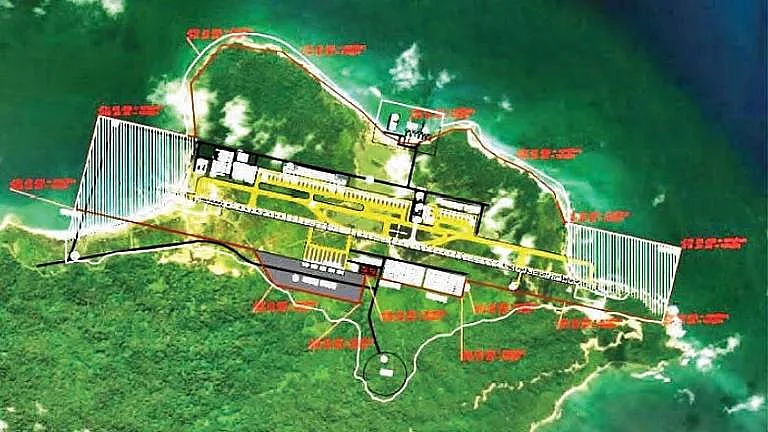Specious argument: Congress on Amit Shah’s defence of Great Nicobar Project
Experts say project poses 'grave and irreversible' threat to island’s fragile ecosystem and indigenous inhabitants

The Congress on Tuesday, 28 October criticised Union home minister Amit Shah’s remarks defending the Great Nicobar Island Development Project, describing his claim that the project would boost India’s maritime trade as a "specious argument" that ignores the "devastating ecological and social impacts" of the plan.
Congress MP and general-secretary (communications) and former Union environment minister Jairam Ramesh said despite repeated warnings from environmentalists, the government continues to "brazenly bulldoze the project through due process".
“The Union Home Minister has unsurprisingly got involved in the debate on the Great Nicobar mega infrastructure project, saying it will boost India’s maritime trade. As several experts have identified, this is a specious argument,” Ramesh said in a statement. “He completely ignores the project’s devastating ecological and social impacts that are beyond doubt.”
Ramesh’s remarks came a day after over 70 scientists, conservationists, and former bureaucrats wrote to environment minister Bhupender Yadav, warning that the holistic development of Great Nicobar Project may cause "grave and irreversible" damage to the island’s fragile ecosystem and its indigenous inhabitants — the Nicobarese and Shompen tribes.
The signatories described the project as an exploitative commercial proposal wrongly labelled as a strategic defence initiative.
“It is disingenuous to label what is essentially a commercial project as a strategic one and invoke national security whenever questions on the project are raised,” the letter said.
The Rs 75,000-crore project includes a transshipment port, an international airport, a power plant, and a township spread over more than 160 sq. km — including 130 sq. km of pristine rainforest inhabited by indigenous communities.
The experts alleged that the rights of the Nicobarese and Shompens under the Forest Rights Act, Andaman and Nicobar Protection of Aboriginal Tribes (ANPAT) Regulation, 1956, and the Shompen Policy, 2015 have been violated.
They claimed that the Environmental Appraisal Committee ignored anthropological and ecological objections before clearing the project. “The Galathea Wildlife Sanctuary was denotified and three new sanctuaries were notified without any consultation with the Great and Little Nicobar islanders — a hollow exercise meant to satisfy Environmental Clearance conditions,” the letter said.
The signatories also flagged a "glaring conflict of interest" in the involvement of government institutes both in preparing and monitoring the project’s environmental management plans.
Among those who signed the letter were historian Ramachandra Guha, wildlife conservationist Romulus Whitaker, ecologist Ravi Chellam, ornithologist Asad Rahmani, and former Gujarat principal chief conservator of forests Ashok Kumar Sharma.
They urged the Centre to “set aside political considerations” and focus instead on “the grave and irreversible implications” for biodiversity and tribal welfare, noting that these concerns are integral to India’s national security calculus.
Ramesh said despite mounting evidence of violations, the Modi government remains indifferent. “From time to time, the media has revealed how this project is being pushed through by ignoring environmental safeguards. Yet none of this is being taken note of by the government,” he said.
Citing the letter, Ramesh said the project represents “a deeply flawed model of development that undermines both ecology and equity”.
Congress Parliamentary Party chairperson Sonia Gandhi, in an article published in The Hindu earlier this month, had termed the Great Nicobar initiative a "planned misadventure" that “threatens the survival of the Shompen and Nicobarese tribes” and "destroys one of the world’s most unique ecosystems".
In response, environment minister Bhupender Yadav defended the project in a counter-article, calling it one of “strategic, defence and national importance”, and claiming that tribal rights and environmental safeguards had been "fully respected".
Speaking on Monday, Shah said the Great Nicobar Development Project would transform the region into a major maritime hub and increase India’s sea trade capacity multiple times, supporting both economic and defence objectives.
However, environmentalists maintain that the project’s scale — which involves extensive forest clearance, coastal reclamation, and displacement of indigenous groups — contradicts India’s commitments to biodiversity conservation and climate resilience.
“The ecological costs are irreversible,” Ramesh warned. “The Modi government must recognise that the real test of national security lies not in commercial expansion but in preserving what is irreplaceable.”
With PTI inputs
Follow us on: Facebook, Twitter, Google News, Instagram
Join our official telegram channel (@nationalherald) and stay updated with the latest headlines
